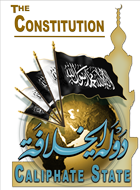 Article 126: The wealth belongs to Allah (swt) alone, and He (swt) has made human beings the trustees of it. Through this general trust they have been given the right to ownership of wealth. Allah (swt) has permitted for the individual to possess the wealth; so through this specific permission, he managed to possess it practically.
Article 126: The wealth belongs to Allah (swt) alone, and He (swt) has made human beings the trustees of it. Through this general trust they have been given the right to ownership of wealth. Allah (swt) has permitted for the individual to possess the wealth; so through this specific permission, he managed to possess it practically.
The evidences for this article are His (swt) words:
((وَآَتُوهُمْ مِنْ مَالِ اللَّهِ الَّذِي آَتَاكُمْ))
“And give them from the wealth of Allah which He has given you.” (TMQ 24:33); so the wealth is ascribed to Allah (swt). And His (swt) words:
((وَيُمْدِدْكُمْ بِأَمْوَالٍ وَبَنِينَ))
“And give you increase in wealth and children.” (TMQ 71:12); so the increase in the wealth for people is ascribed to Allah (swt). Also, His (swt) words:
((وَأَنْفِقُوا مِمَّا جَعَلَكُمْ مُسْتَخْلَفِينَ فِيهِ ))
“And spend out of that in which He has made you successors.” (TMQ 57:7), and so accordingly He (swt) made man the trustees of Allah (swt) in the wealth, as it was Allah (swt) who made them the inheritors, so the wealth in origin belongs to Allah (swt). Therefore, the ownership of the wealth is with Allah (swt), but He (swt) has made the people the trustees of it, which has given them the right to its ownership. For this reason the verse regarding the entrustment is not an evidence for private ownership, but rather it is evidence that the human being from the aspect of being human, has the right of ownership of wealth.
As for practical private ownership, or in other words, the fact that it is permitted for him to actually possess wealth, this comes from another evidence, which is the cause which permitted the individual to practically come into possession. For example his  words:
words:
«مَنْ أَحَاطَ حَائِطًا عَلَى أَرْضٍ فَهِيَ لَهُ»
“If anyone surrounds a land with a wall, it belongs to him.” (reported by Ahmad and Abu Dawud with a chain authenticated by Al-Jarwad and Al-Zayn), and his  words:
words:
«مَنْ أَحْيَا أَرْضًا مَيِّتَةً فَهِيَ لَهُ»
“whoever revives dead land, then it is his” reported by Al-Bukhari for Umar as a Ta’liq (title heading without chain mentioned) and also reported by Ahmad and Al-Tirmidhi with an authentic chain from Jabir, and the words of Allah (swt):
((لِلرِّجَالِ نَصِيبٌ مِمَّا تَرَكَ الْوَالِدَانِ وَالْأَقْرَبُونَ وَلِلنِّسَاءِ نَصِيبٌ مِمَّا تَرَكَ الْوَالِدَانِ وَالْأَقْرَبُونَ)) [النساء 7] ومن مثل قوله تعالى: ((أُحِلَّ لَكُمْ صَيْدُ الْبَحْرِ))
“For men is a share of what the parents and close relatives leave, and for women is a share of what the parents and close relatives leave.” (TMQ 4:7) and: “Lawful to you is game from the sea.” (TMQ 5:96), amongst other texts.
Accordingly, the right of ownership of whatever Allah (swt) created is confirmed for every human, and practical ownership requires permission from the Legislator (swt) regarding how it can be achieved and which wealth can be sought. In other words, evidence from the Shari’ah is required which permits this possession to practically take place. Therefore, the article comprises of three elements.
Firstly, that ownership is for Allah (swt):
((وَآَتُوهُمْ مِنْ مَالِ اللَّهِ ))
“And give them from the wealth of Allah which He has given you.” (TMQ 71:12).
Secondly, that the person has the right to own wealth, the evidence being the verse regarding entrustment/succession:
((وَأَنْفِقُوا مِمَّا جَعَلَكُمْ مُسْتَخْلَفِينَ فِيه))ِ
“And spend out of that in which He has made you successors.” (TMQ 57:7).
Thirdly, that the practical taking of ownership of the wealth by the individual requires permission from the Legislator (swt) - in other words, evidence which permits the ownership of it in practical terms, and the evidence for this are the texts regarding the permission of practically taking ownership.
Accordingly the evidences for this article have been made clear.

